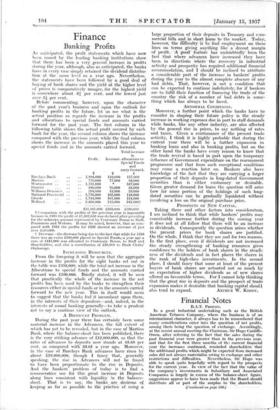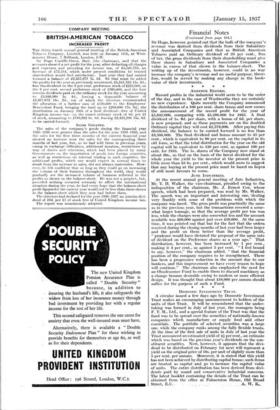Financial Notes
B.A.T. PaoFrrs.
In a great industrial undertaking such as the British American Tobacco Company, where the business is of an international character, it always has to be remembered that many considerations enter into the question of net profits, among them being the question of exchange. Accordingly, at the recent annual meeting the Chairman, Sir Hugo Cunliffe- Owen, after referring to the fact that the sales during the past financial year were greater than in the previous year, and that for the first three months of tha Current financial year the increases continued, reminded Shareholders' that the additional profits which might be expected from increased sales did not always materialise owing to exchange and other restrictions and difficulties. Nevertheless, Sir Hugo was able to speak quite hopefully with regard to the prospects for the current year. In view of the fact that the value of the company's investments in Subsidiary and Associated Companies is largely in 'excess of the balance-sheet figure, suggestions appear to have been made that the Board should distribute all or part of the surplus to the shareholders.
(Continued on page 106.)
Financial Notes
(Continual from page 104.) Sir Hugo, however, pointed out that the bulk of the company's revenue was derived from dividends from their Subsidiary and Associated Companies and that as British American Tobacco paid an Ordinary dividend of 20 per cent., free of tax, the gross dividends from their shareholding -must give these shares in Subsidiary and Associated Companies a value in excess of that shown in the balance-sheet. The writing up of the investments, however, could in no way increase the company's revenue and no useful purpose, there- fore, would be served by making any change in the book- value of their investments.
* * * * ANC/WIER RECORD.
Record profits in the industrial world seem to be the order of the day, and in the case of Woolworths they are certainly no new experience. Quite recently the Company announced the distribution of a 100 per cent. share bonus and now comes the announcement of the record profit for the year of £5,832,000, comparing with £5,298,000 for 1985. A final dividend of 1s. 9d. per share, with a bonus of 6d. per share, is now proposed, and as these payments are on the doubled Ordinary capital they will cost /2,573,000. After paying this dividend, the balance to be carried forward is no less than £3,508,000. The final dividend and bonus amount to 45 per cent., which is equivalent to 90 per cent. on the capital in its old form, so that the total distribution for the year on the old capital will be equivalent to 120 per cent, as against 100 per cent. for 1935. The 5s. shares of the Company now stand at about 90s., so that on the basis of the latest dividend for the whole year the yield to the investor at the present price is little more than £8 6s. per cent., which would seem to suggest that any buying at the present price must be based on hopes of still more favours to come.
JUTE INDusrams.
At the recent annual general meeting of Jute Industries, Mr. T. H. Walker, the vice-chairman, presided owing to the indisposition of the chairman, Mr. J. Ernest. Cox, whose speech, which had been prepared, was read by Mr. Walker. The speech was an important and interesting one, 'dealing very fiankly with some of the problems with which the company was faced. The gross profit was practically the same as in the previous year, but the transactions covered a some- what larger tonnage, so that the average profit per ton was less, while the charges were also somewhat less and the amount available was £69,000 against just over £50,000. At the same time, it was pointed out that but for the fact that the orders received during the closing months of last year had been larger and the profit on them better than the average profit, " prudence would have dictated the proposal of the same rate of dividend on the Preference shares as a year ago." That distribution, however, has been increased by 1 per cent., making it 4 per cent., as against 3 per cent. I feel bound to say, however," the chairman added, " that the financial position of the company requires to be strengthened. There has been a progressive reduction in the amount due to our bankers, and this improvement we have every reason to hope will continue." The chairman also emphasised the need for an Obsolescence Fund to enable them to discard machinery as a change became desirable owing to modern or more efficient design. It was thought that about £10,000 per annum should suffice for the purpose of such a Fund.
* * * * DOMESTIC INVESTMENT TRUST.
A circular issued a few days ago by Domestic Investment Trust makes an encouraging announcement to holders of the units of that Trust. It will be remembered that the under- taking was formed in July of last year, the managers being F. T. M., Ltd., and a special feature of the Trust was that the fund was to be spread over the securities of nationally-known companies which manufacture or supply food and other essentials.. The portfolio of selected _securities was a large one, while the company ranks among the fully flexible trusts. At the time of the first sale of units in July of last year the Trust announced an estimated yield of 41 per cent., an estimate which was based on the previous year's dividends on the con- stituent securities. Now, however, it appears that the divi- dend to be distributed on February 1st next will represent a yield on the original price of 10s. per unit of slightly more than 5 per cent. per annum. Moreover, it is stated that this yield has not been achieved bydistributing capital bonus; such items are treated as capital and go to increase the capital value of units. The entire distribution has been derived from divi- dends paid by sound and conservative industrial concerns. The latest booklet containing the details of the Trust can be obtained from the office at Palmerston House, Old Broad











































 Previous page
Previous page